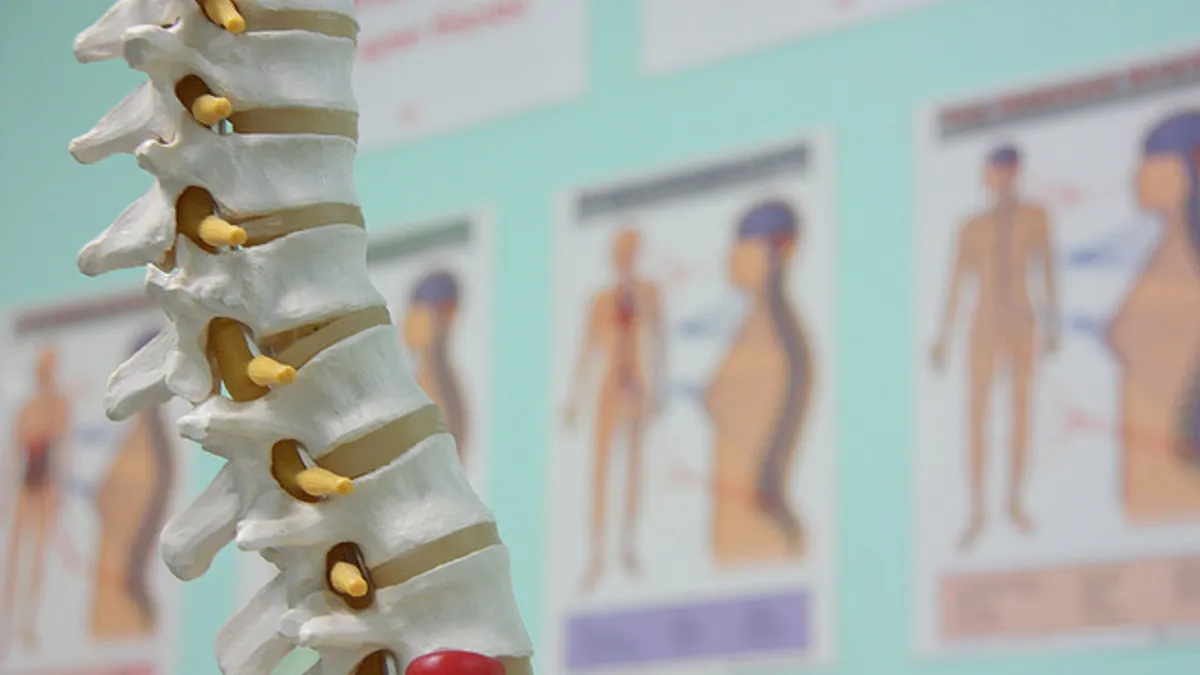Dive Brief:
-
NuVasive announced Wednesday that it has bought Simplify Medical for $150 million upfront to expand its cervical spine technology portfolio. Johnson & Johnson, Medtronic and Zimmer Biomet are all active in the cervical disc space.
-
Simplify markets a cervical artificial disc that outperformed anterior cervical discectomy and fusion (ACDF) in a randomized clinical trial. The takeover adds to NuVasive’s internal efforts to move beyond its traditional focus on anterior devices and into what the company estimates is a $2.6 billion segment of the global spine market.
-
However, Simplify will add to the pandemic-related challenges for NuVasive in 2021, with investments to train surgeons and run clinical trials offsetting the low anticipated sales this year. Jefferies analysts said that while the deal "makes strategic sense" the upfront contribution will be minimal with an additional $5 million in sales forecasted for 2021.
Dive Insight:
NuVasive outlined plans to expand in cervical surgery back in 2019. At that time, the spine specialist calculated it controlled 5% of a $1.5 billion global market, making it the biggest growth opportunity open to the company. NuVasive moved to claim a bigger piece of the market late last year with the introduction of its C360 cervical spine portfolio.
Now, NuVasive has used its cash reserves to accelerate its expansion. Simplify won FDA approval for its cervical artificial disc in 1-level indications, positioning it to start marketing the device for use in patients with disease at one level of the cervical spine.
NuVasive will continue Simplify's efforts to expand use of the device to 2-level indications. In doing so, NuVasive CEO Chris Barry expects to unlock the commercial potential of the acquired assets.
"Clearly you're seeing a transition of ACDF procedures to disc replacement. The indication today is more narrow, but increasing over time. So I think it's still a question of what the size of this market could become. Clearly within Simplify it's somewhat pre-commercial,” Barry told investors.
The pre-commercial nature of Simplify means the acquisition will create near-term headwinds. This year, NuVasive expects the acquired assets to add sales of around $5 million. NuVasive will need to invest in the training and conversion of surgeons, as well as clinical trials, ahead of the realization of significant sales, leading it to predict the takeover will be a $10 million headwind to operating margin in the first year.
NuVasive expects the Simplify assets to become more important contributors as it moves deeper into 2021 and onto 2022. That pattern mirrors NuVasive’s expectations for its broader business, which is still facing disruption due to the pandemic. Sales fell 6% in the fourth quarter and the pressures that caused that decline dragged on into early 2021.
"What we are concerned about is the first quarter, because of the continuing impact from COVID and to a lesser extent some of the weather challenges we've had in the U.S. We do think in the second quarter things will get better, there'll be less impact from COVID. And then in the back half of the year, we'll have very strong results," NuVasive CFO Matt Harbaugh told investors.
NuVasive opted against providing full-year guidance. Harbaugh expects sales in the first quarter to come in at around the same level as the start of 2020, when NuVasive brought in $260 million. Sales could ramp up sequentially in later quarters as the pandemic eases and demand for products such as C360 and the Simplify disc start to ramp up.
However, Jefferies analysts in a Friday note said that near-term challenges and uncertainty in the spine market "lend little confidence to an improving growth outlook" with 2021 shaping up as a "transitional" year reflecting ongoing COVID-19 headwinds for spine procedures.










